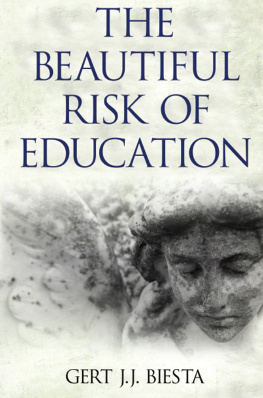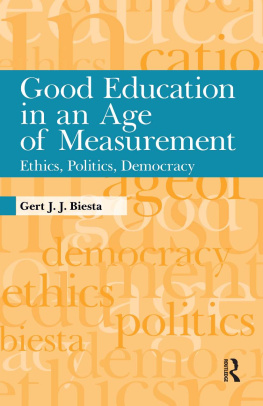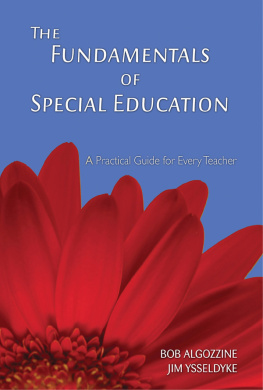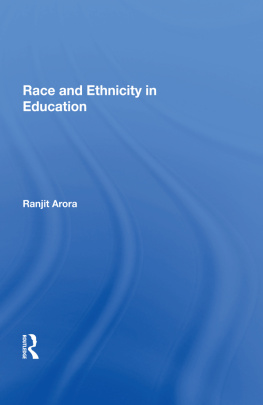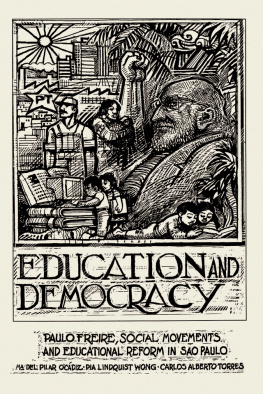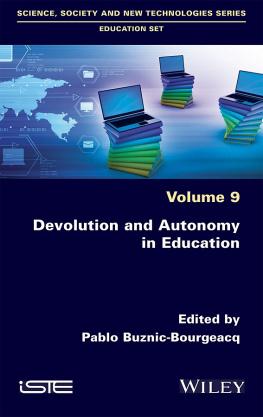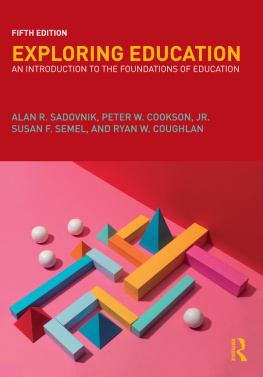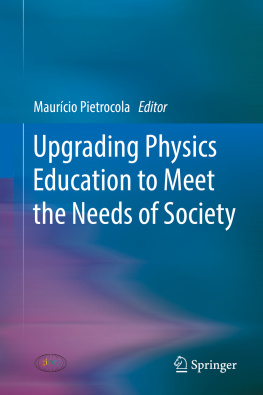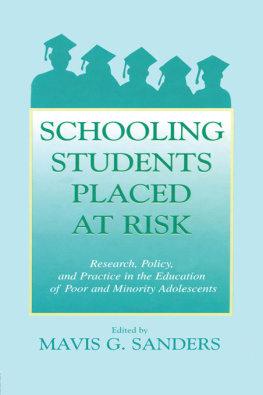
THE BEAUTIFUL RISK OF EDUCATION
Interventions: Education, Philosophy, and Culture
Edited by Michael A. Peters
The Beautiful Risk of Education
By Gert J. J. Biesta (2013)
Subjects in Process: Diversity, Mobility, and the Politics of Subjectivity in the 21st Century
Edited by Michael A. Peters and Alicia de Alba (2012)
Good Education in an Age of Measurement: Ethics, Politics, Democracy
By Gert J. J. Biesta (2010)
Toward an Imperfect Education: Facing Humanity, Rethinking Cosmopolitanism
By Sharon Todd (2009)
Democracy, Ethics, and Education: A Thin Communitarian Approach
By Mark Olssen (2007)
Beyond Learning: Democratic Education for a Human Future
By Gert J. J. Biesta (2006)
Education, Globalization, and the State in the Age of Terrorism
Edited by Michael A. Peters (2005)
THE BEAUTIFUL RISK OF EDUCATION
Gert J. J. Biesta

First published 2013 by Paradigm Publishers
Published 2016 by Routledge
2 Park Square, Milton Park, Abingdon, Oxon OX14 4RN
711 Third Avenue, New York, NY 10017, USA
Routledge is an imprint of the Taylor Francis Group, an informa business
Copyright 2013, Taylor & Francis.
All rights reserved. No part of this book may be reprinted or reproduced or utilised in any form or by any electronic, mechanical, or other means, now known or hereafter invented, including photocopying and recording, or in any information storage or retrieval system, without permission in writing from the publishers.
Notice:
Product or corporate names may be trademarks or registered trademarks, and are used only for identification and explanation without intent to infringe.
Library of Congress Cataloging-in-Publication Data
Biesta, Gert, author.
The beautiful risk of education / Gert J. J. Biesta.
pages cm. (Interventions: education, philosophy, and culture)
Includes bibliographical references and index.
ISBN 978-1-61205-026-3 (hardcover : alk paper)
ISBN 978-1-61205-027-0 (pbk : alk. paper)
1. EducationPhilosophy. 2. EducationAims and objectives. 3. TeachingPhilosophy. I. Title.
LB14.7.B527 2012
370.1dc23
2012043666
Designed and Typeset in Adobe Garamond by Straight Creek Bookmakers.
ISBN 13 : 978-1-61205-026-3 (hbk)
ISBN 13 : 978-1-61205-027-0 (pbk)
One has to accept that it [a] (the other, or whatever it may be) is stronger than I am, for something to happen. I have to lack a certain strength, I have to lack it enough, for something to happen. If I were stronger than the other, or stronger than what happens, nothing would happen. There has to be weakness.
Jacques Derrida (2001, p. 64)
Contents
Acknowledgments
When my book Beyond Learning: Democratic Education for a Human Future was published in 2006 it felt like the end of a long journey. Beyond Learning contained ideas I had been working on since the late 1990s and was a first attempt to bring them together in a book-length publication. Doing so was first of all helpful for me, as it allowed me to see themes and connections I had not really appreciated before. This is why I suggested, carefully, that the ideas in the book perhaps amounted to a theory of education. Others recognized this too, as became clear in the responses from reviewers, colleagues, students, and, perhaps most notably, from teachers and teacher educators working in a wide range of different contexts and settings around the world. The ideas in the book apparently struck a chord with them. Readers came to appreciate the versatility of the idea of a pedagogy of interruption and the joint concepts of coming into the world and uniqueness with which I aimed to articulate an educational vocabulary that would make it possible to respond to the challenge of thinking and doing education without the possession of a truth about what the human subject is or should become. Readers also responded positively to my attempt to explore a more intrinsic connection between education and democracy and to my critique of the impact of a new language of learning on education.
In the book that followed in 2010, Good Education in an Age of Measurement, I added several things to the discussion. Perhaps the most significant one was the introduction of a framework that allowed me to locate the ideas developed in Beyond Learning within a wider discussion about the functions and purposes of education. In Good Education I suggested that educational processes and practices always operate in three overlapping domains to which I referred as qualification, socialization, and subjectification. On the one hand the distinction between these domains allowed me to argue that questions about good education always need to be addressed in relation to what one aims to achievethere is never anything good or desirable about educational processes and practices themselvesalso highlighting that education is never one-dimensional in its intentions and ambitions so that there is always the difficult question of how to strike the right balance. On the other hand the framework allowed me to show with more clarity that the main focus of Beyond Learning had been on the subjectification dimension of education, that is, on the ways in which education contributes to the ways in which newcomers come into the world as unique, singular beingsto put it in the language of Beyond Learning. I could thus make clear that subjectification is not the be-all and end-all of education, although I would maintain that without an interest in this dimension education runs the risk of becoming just another instrument of social reproduction. The chapters in Good Education were then partly meant to explain why the question of purpose, the question as to what education is for, had almost disappeared from the educational discussionsomething that I connected to debates about evidence and accountability in education and the wider learnification of educational discoursesand partly to provide those who share my concern for good education in the broad sense of the word with a language to (re)engage with questions of purpose in a more explicit and more deliberate manner. This I did by further developing the notion of a pedagogy of interruption, the question of democratic education, and the idea of educational inclusion.
The present book in a sense concludes the trajectory I began in Beyond Learning. It focuses on a theme that was implicit in the other two books but that, in my view, deserves a more explicit treatment, not in the least because it has important implications for the ways in which one might wish to engage with my ideas in practical settings such as schools, colleges, and universities, or in relation to adult or community education. The aim of the present book is to explore different dimensions of what I will refer to as the weakness of education. The weakness of education refers to the fact that educational processes and practices do not work in a machine-like way. The argument I put forward in this book is that the weakness of education should not be seen as a problem that needs to be overcome, but should rather be understood as the very dimension that makes educational processes and practices educational. This is why any attempt to eradicate the weakness of education, any attempt to make education into a perfectly operating machinesomething that is not entirely impossible, although I will argue that the price to pay for this is in most if not all cases too highultimately turns education against itself. The weakness of education thus signals that any engagement in educationboth by educators and by those being educatedalways entails a
Next page
